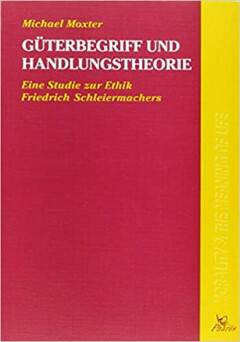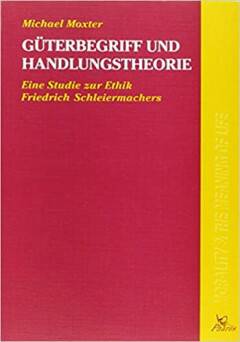
Je cadeautjes zeker op tijd in huis hebben voor de feestdagen? Kom langs in onze winkels en vind het perfecte geschenk!
- Afhalen na 1 uur in een winkel met voorraad
- Gratis thuislevering in België vanaf € 30
- Ruim aanbod met 7 miljoen producten
Je cadeautjes zeker op tijd in huis hebben voor de feestdagen? Kom langs in onze winkels en vind het perfecte geschenk!
- Afhalen na 1 uur in een winkel met voorraad
- Gratis thuislevering in België vanaf € 30
- Ruim aanbod met 7 miljoen producten
Zoeken
€ 29,25
+ 58 punten
Omschrijving
If philosophy claims to be competent on foundational questions of ethics, one of its central problems becomes the alternative 'deontological versus teleological ethics'. From the historical and systematical point of view this alternative can be captured in the formula 'Kant or Aristotle ?' Schleiermacher's 'Guterethik' (ethics of goods) can be read as an attempt of a post-Kantian rehabilitation of the aristotelian approach. That this attempt is not a mere repetition of older scholastic approaches, is shown by its act-theoretical perspective, which is mounted critically against Kant. The distinction made by Kant between phaenomena and noumena leaves no room for an idea of human acts. In contrast, Schleiermacher's 'goods' do present a structural framework in which acts can appear amidst a social world. With these, a diversity of recognition modalities and a differentiated compound of societal institutions move to the center of ethical reflection. To test the solidity of this approach, one has to distinguish in Schleiermacher's texts between a metaphysical and a meaning-critical strain of thought. In this, Schleirmacher's reception of the contemporary notion of organism separates him from a crude neo-aristotelianism and connects him with Hegel's philosophy of law.
Specificaties
Betrokkenen
- Auteur(s):
- Uitgeverij:
Inhoud
- Aantal bladzijden:
- 255
- Taal:
- Duits
- Reeks:
Eigenschappen
- Productcode (EAN):
- 9789039000427
- Verschijningsdatum:
- 1/01/1992
- Uitvoering:
- Hardcover
- Formaat:
- Trade paperback (VS)
- Afmetingen:
- 148 mm x 219 mm
- Gewicht:
- 426 g

Alleen bij Standaard Boekhandel
+ 58 punten op je klantenkaart van Standaard Boekhandel
Beoordelingen
We publiceren alleen reviews die voldoen aan de voorwaarden voor reviews. Bekijk onze voorwaarden voor reviews.









